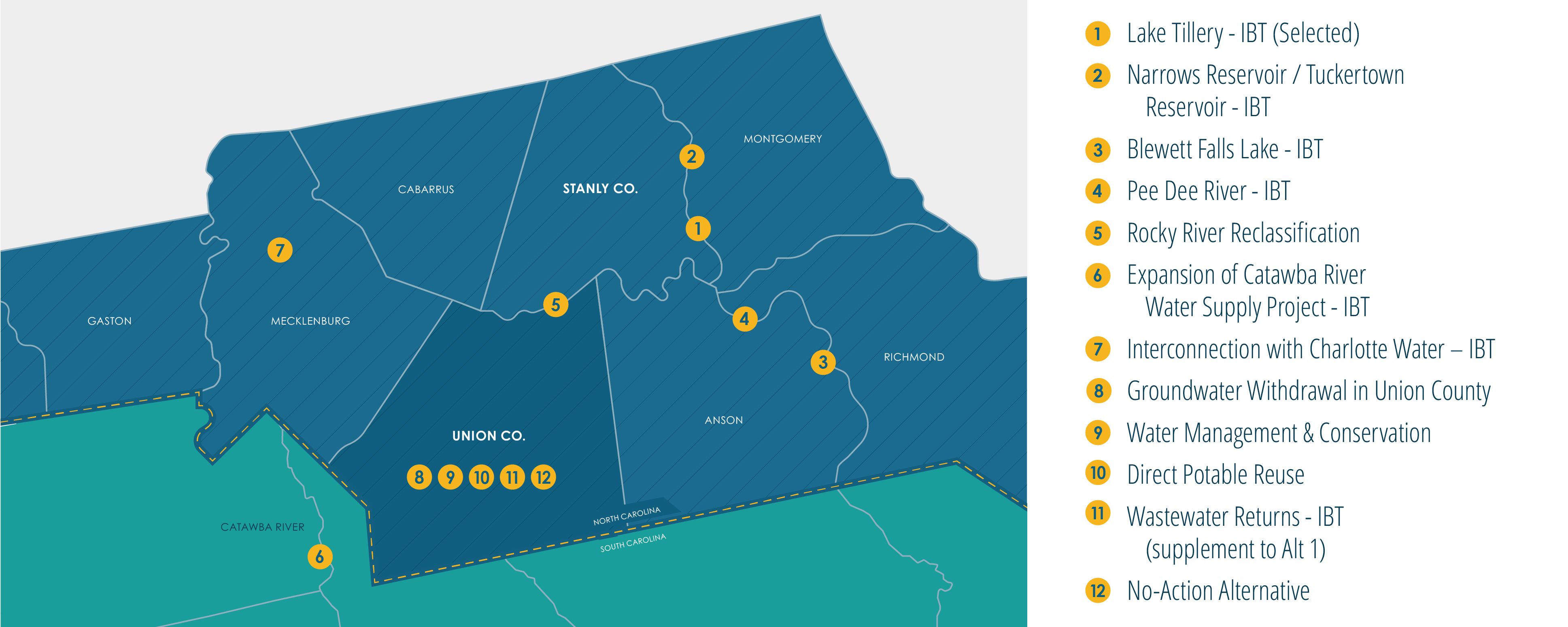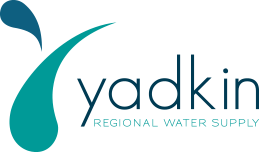Frequently Asked Questions
What are the project’s benefits?
This project provides a variety of benefits:
- Union County will secure a long-term, sustainable water supply for Yadkin River Basin customers to support existing and future development.
- The Town of Norwood will be able to access four times the amount of water its current facilities provide. The new, higher-capacity water intake facility and pump station will replace WWII-era infrastructure that has not received major renovations since the 1980s. The project also provides Norwood with a new monthly revenue stream.
- Stanly County will have access to 1.5 million gallons of water per day at project completion and up to 2 million gallons per day beginning in 2033. The project will also provide Stanly County with an ongoing revenue stream.
When will construction begin and how long will it take?
Construction activities began in the fall of 2020. The project team expects construction to last for approximately two and a half to three years, with completion anticipated in 2023. Pipeline construction on any given property is likely to take a few weeks or less.
Questions? Visit the Construction page for more information.
What is the project’s budget?
In total, the YRWSP will be an approximately $300 million investment. A substantial portion of the project will be funded through bond debt, meaning future Union County water and sewer customers will contribute to covering the cost of the infrastructure.
Did Union County need to get an Interbasin Transfer (IBT) Certificate to use water from Lake Tillery?
Yes. Union County was awarded an IBT in May 2017 after investing more than five years, $3 million and thousands of hours to ensure the project met the state’s requirements:
- Necessary, beneficial and reasonable.
- Considered other reasonable water source alternatives.
- Environmentally sound and not detrimental to the water source or the basin receiving the water.
You can find a link to the full IBT Certificate in the Resources section to the right.
What other water supply alternatives were considered?
In addition to the YRWSP, 11 other alternatives were considered.
On the map below, Alternatives 2, 3, 4, 7 and 11 would have also required an IBT certificate, while Alternative 6 would have required the restructuring of an existing IBT certificate.
Alternative 5 would have required the State of North Carolina to reclassify the Rocky River for use as a municipal water source.
Alternatives 8, 9 and 10 would have relied on the County’s existing resources through such means as well water, direct potable reuse and increased conservation. Including Alternative 12, the no-action alternative, each of these methods had limited viability. Yields from large-scale groundwater withdrawal and increased conservation practices were not expected to provide enough water to sustain Union County's growth, and direct potable reuse is not allowed to be used as a water supply in North Carolina.

Descriptions of all considered alternatives can be found on pages 15-18 of the IBT Certificate
Who will be able to get water from the project?
The project will help to ensure a secure, sustainable water supply for over 180,000 customers in Union County’s Yadkin River Basin and the Town of Norwood. Stanly County will also have access to up to 1.5 million gallons of water per day upon project completion.
Pipeline
To view the alignment of the project’s pipelines and construction progress, visit the Construction page.
How did you determine the pipeline route?
Multiple routes were analyzed. The analysis considered numerous factors including topography, total distance, property acquisitions and environmental impacts. The preferred route minimized negative impacts while presenting the most technically and economically feasible option.
I have well water. Can I hook up to the pipeline for water to be provided to my house?
No. The water supply pipeline will carry untreated water direct from Lake Tillery which is not suitable for drinking, and the water supply pipeline will not be compatible with small connections. It will feed into Union County’s existing Yadkin River Basin water delivery network.
Intake Facility
To view the intake design and learn more about the intake facility on Lake Tillery, visit the Intake Facility page.
Will the facility be loud?
Pumps will cycle on and off throughout the day, but will be housed inside. Sound attenuation will be considered in the facility’s design.
How will the project impact water levels in Lake Tillery?
Early in the planning process, the project team conducted a study to investigate potential impacts to Lake Tillery. The study found that minor deviations to the lake – less than one-half inch – could happen one to two percent of the time, or to say it another way, three to seven days in a year. These impacts mean that even with warmer future weather and potential droughts, water level impacts would remain minor.
In more concrete terms, the lowest water level during the worst drought will still be two feet above the bottom of Lake Tillery’s public boat ramps.
It is important to note that lake levels will always stay within Lake Tillery’s current operating range, controlled by Duke Energy. However, at times Duke Energy will allow temporary maintenance drawdowns once every five years – these generally do not last more than two to three weeks and are not related to the Yadkin Regional Water Supply Project.
For more information, please watch the short video below.
RESOURCES
Links:
- Municipal Water Leader Featuring YRWSP
- North Carolina Waterworks Operations Association Article Featuring YRWSP
- WaterWorld Article Featuring the YRWSP
- FERC Lake Use Permit Application Approval
- FERC Environmental Assessment
- Easement Policy - Stanly County
- Easement Policy - Union County
- Final Environmental Impact Statement
- Interbasin Transfer Certificate
- North Carolina Division of Water Resources
- North Carolina Environmental Management Commission
- Yadkin-Pee Dee Water Management Group
Newsletters
- Fall 2023 Newsletter
- October 2022 Newsletter
- January 2020 Newsletter
- Fall 2018 Video Newsletter
- April 2018 Newsletter
- November 2016 Newsletter
- July 2016 Newsletter
- April 2016 Newsletter
